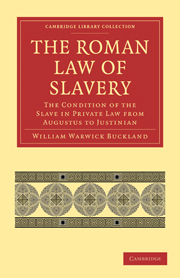Book contents
- Frontmatter
- PREFACE
- Contents
- ERRATA, ADDENDA, AND LIST OF ABBREVIATIONS
- LIST OF PRINCIPAL ABBREVIATIONS
- PART I CONDITION OF THE SLAVE
- CHAPTER I Definition and General Character
- CHAPTER II The Slave as Res
- CHAPTER III The Slave as Res (cont.). Sale of Slaves
- CHAPTER IV The Slave as Man. Non-Commercial Relations
- CHAPTER V The Slave as Man (cont.). Non-Commercial Relations (cont.). Delicts by Slaves
- CHAPTER VI The Slave as Man (cont.) Commercial Relations apart from Peculium. Acquisitions
- CHAPTER VII The Slave as Man (cont.). Commercial Relations apart from Peculium. Liabilities
- CHAPTER VIII The Slave as Man (cont.). Commercial Relations. Peculium. Acquisitions, Alienations, etc
- CHAPTER IX The Slave as Man (cont.). Commercial Relations. Peculium (cont.). Liabilities
- CHAPTER X Special Cases
- CHAPTER XI Special Cases (cont.)
- CHAPTER XII Special Cases (cont.)
- CHAPTER XIII Special Cases (cont.)
- CHAPTER XIV Special Cases (cont.)
- CHAPTER XV Special Cases (cont.)
- CHAPTER XVI Special Cases (cont.)
- PART II ENSLAVEMENT AND RELEASE FROM SLAVERY
- APPENDIX I The relation of the contractual actions adiectitiae qualitatis to the Theory of Representation
- APPENDIX II Formulation and Litis Consumptio in the actions adiectitiae qualitatis
- APPENDIX III Form used by Slave in acquisition by Mancipatio, etc.
- APPENDIX IV The essential character of Manumission: Iteratio
- APPENDIX V Manumission vindicta by a, filiusfamilias
- INDEX
CHAPTER XV - Special Cases (cont.)
Published online by Cambridge University Press: 07 September 2010
- Frontmatter
- PREFACE
- Contents
- ERRATA, ADDENDA, AND LIST OF ABBREVIATIONS
- LIST OF PRINCIPAL ABBREVIATIONS
- PART I CONDITION OF THE SLAVE
- CHAPTER I Definition and General Character
- CHAPTER II The Slave as Res
- CHAPTER III The Slave as Res (cont.). Sale of Slaves
- CHAPTER IV The Slave as Man. Non-Commercial Relations
- CHAPTER V The Slave as Man (cont.). Non-Commercial Relations (cont.). Delicts by Slaves
- CHAPTER VI The Slave as Man (cont.) Commercial Relations apart from Peculium. Acquisitions
- CHAPTER VII The Slave as Man (cont.). Commercial Relations apart from Peculium. Liabilities
- CHAPTER VIII The Slave as Man (cont.). Commercial Relations. Peculium. Acquisitions, Alienations, etc
- CHAPTER IX The Slave as Man (cont.). Commercial Relations. Peculium (cont.). Liabilities
- CHAPTER X Special Cases
- CHAPTER XI Special Cases (cont.)
- CHAPTER XII Special Cases (cont.)
- CHAPTER XIII Special Cases (cont.)
- CHAPTER XIV Special Cases (cont.)
- CHAPTER XV Special Cases (cont.)
- CHAPTER XVI Special Cases (cont.)
- PART II ENSLAVEMENT AND RELEASE FROM SLAVERY
- APPENDIX I The relation of the contractual actions adiectitiae qualitatis to the Theory of Representation
- APPENDIX II Formulation and Litis Consumptio in the actions adiectitiae qualitatis
- APPENDIX III Form used by Slave in acquisition by Mancipatio, etc.
- APPENDIX IV The essential character of Manumission: Iteratio
- APPENDIX V Manumission vindicta by a, filiusfamilias
- INDEX
Summary
BONA FIDE SERVIENS.
The expressions qui bona fide servit, and bona fide serviens are rather misleading. The bona fides really in question is that of the holder. This would be a priori almost certain (for it is scarcely conceivable that the classical lawyers should have made the animus of the slave decisive) and the texts leave no doubt. They are cited by Salkowski, who shews that bona fide possidere and bona fide servire are used interchangeably, and that there are texts which expressly make the bona fides attach to the possessor.
As to what is involved in bona fides a few words are necessary. Gaius tells us there must be a iustapossessio. This appears to mean that iusta causa is required. On the other hand it is immaterial that the slave is furtiims. So far as the bona fides itself is concerned, the texts give no indication that the words have any meaning other than that they bear in the law of usucapio. But just as a man may have bona fides and yet be unable to usucapt, because the thing is furtiva, so it is conceivable that one who cannot usucapt because his possession began in bad faith, may become a bonae fidei possessor for our purpose in the course of events. Broadly speaking a bonae fidei possessor is one who supposes himself to have the rights of owner, and whose acts will be regulated on that assumption. No man regards himself at the moment as a bonae fidei possessor.
- Type
- Chapter
- Information
- The Roman Law of SlaveryThe Condition of the Slave in Private Law from Augustus to Justinian, pp. 331 - 371Publisher: Cambridge University PressPrint publication year: 2010First published in: 1908



